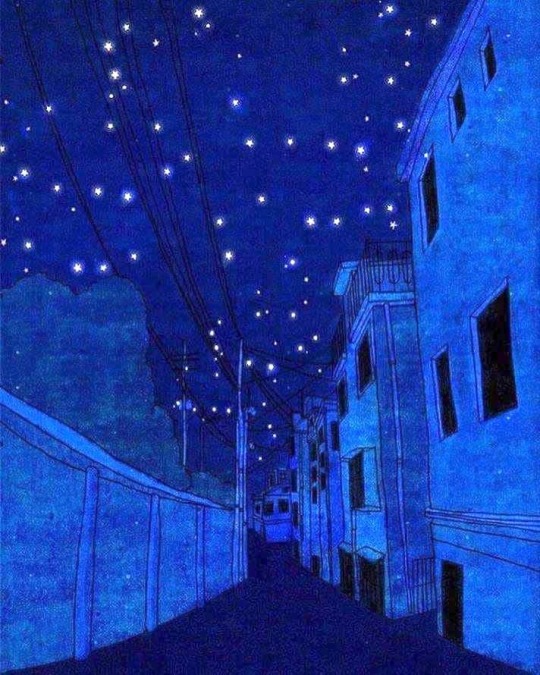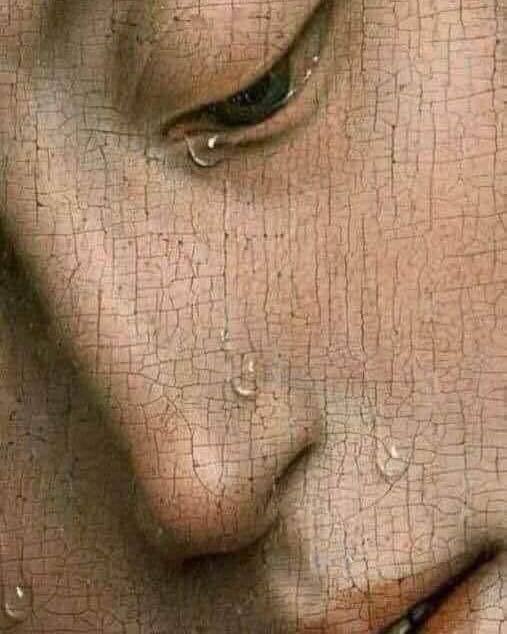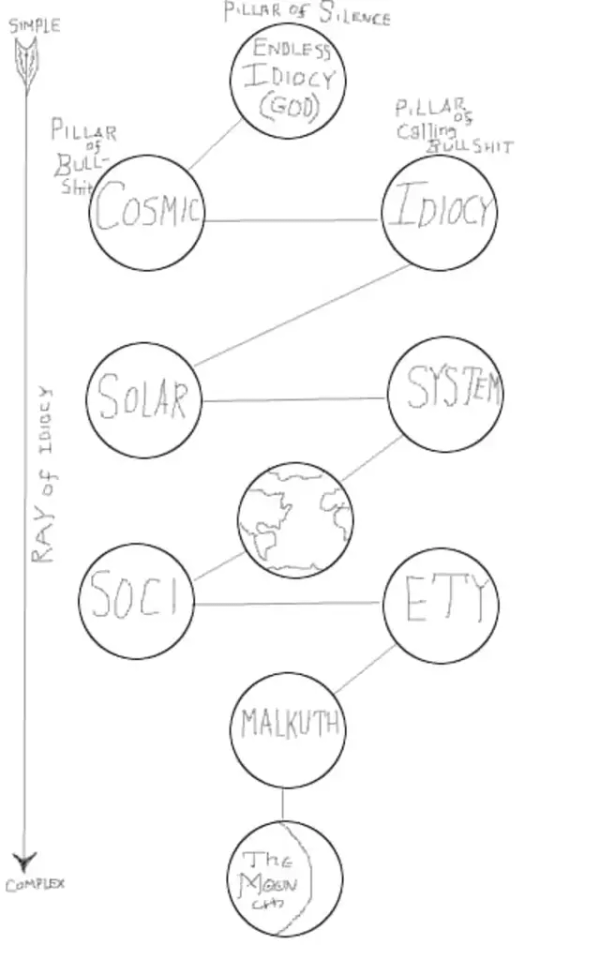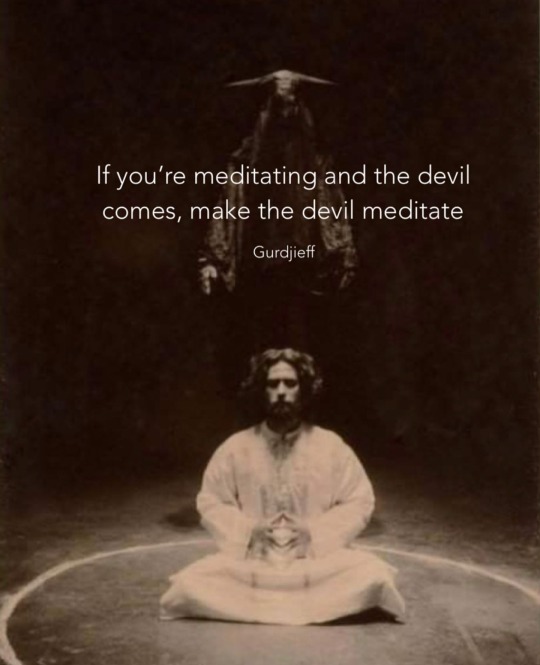#Gurdjieff
Text

'Starlit street at night', c. 1990s, by Fukuōji Kazuhiko (福王寺 一彦; born 1953), a contemporary Nihonga (Japanese-style) painter from Mitaka, Tokyo.
(Jaded in Japan)
* * * *
"Work as if everything depends on work.
Pray as if everything depends on Prayer."
~ Gurdjieff
3K notes
·
View notes
Text
"Remember you come here having already understood the necessity of struggling with yourself—only with yourself. Therefore thank everyone who gives you the opportunity."
—G. I. Gurdjieff
133 notes
·
View notes
Photo



“In Search of the Miraculous”
71 notes
·
View notes
Text
"Cuando un hombre comienza a conocerse un poco, verá en sí mismo muchas cosas que seguramente lo horrorizarán. Mientras un hombre no se horrorice consigo mismo, no sabe nada de sí mismo".
Ouspensky.
#ouspensky#escritos#reflexión#frases#escritor#libros#cuentos#citas en español#filosofía#filósofo#libros filosofía#conocimiento#cuarto camino#spanish quotes#spanish#literatura#literatura latina#literature#literary#gurdjieff#autoconocimiento
32 notes
·
View notes
Text
Theodore J. Nottingham, the wisdom of the fourth way, pg. 14-15 (on google drive)
(the book is in epub, so get a epub reader or convert it using an epub to pdf converter)
the illusion of unity.
Another central idea in the Fourth Way is that the individual is not one. We have no permanent "I" or Ego. Every thought, feeling, sensation, desire is an "I" which believes that it is the whole person. Yet none of these "I's" are connected and each depends on the change of external circumstances. To make things worse, there are often impenetrable defenses between each "I" which the Work calls "buffers" separating these subpersonalities from one another. Gurdjieff states that one of our most important mistakes we make is our illusion about our unity.
He writes: "His "I" changes as quickly as his thoughts, feelings, and moods, and he makes the profound mistake in considering himself always one and the same person; in reality he is always a different person, not the one he was a moment ago."
Our every thought and desire lives separately and independently from the whole. According to Gurdjieff, we are made of thousands of separate I's, often unknown to one another, and sometime mutually exclusive and hostile to each other.
The alternation of I's is controlled by accidental external influences. There is nothing in us able to control the change of I's, mainly because we do not notice it. Each separate I calls itself "I" and acts in the name of the whole person. This explains why people so often make decisions and so seldom carry them out.
A little self observation will prove that we usually think, feel, move and respond to the stimulations acting on us, without our being aware of what is happening within us. This self-observation is in fact the first practical effort required in the Fourth Way. The student is to create an "observing I" which observes with objectivity his or her inner activity. To develop an objective space within which can see without judging is extremely difficult but is also the first breakthrough out of our mechanical behavior and the virtual hypnotic trance in which it keeps us.
19 notes
·
View notes
Text
“People don’t value what is easily come by.”
“I love him who loves work.”
- Gurdjieff.
9 notes
·
View notes
Text
You have dogs within you, you must become their master.
You have dogs within you, you must become their master. If you find the animal that is within you, you can understand it. It is not a matter of scolding the animal, it is part of you. You must get to know its nature: it barks, it attacks; but if you understand it, and love it, it will be pleased to serve you, it will not have to be on the defensive, because it will feel loved, understood and it will love you.
— G.I. Gurdjieff, Becoming Conscious with G.I. Gurdjief by Solange Claustres (Eureka Editions, February 20, 2021) (via Alive on All Channels)
20 notes
·
View notes
Text

Rogier van der Weyden (Flemish, 1399 - 1464)
Descent from the Cross (Ca-1435)
Museo del Prado, Madrid, Spain
* * * *
"Each time you feel the beginning of weakness, relax and then think seriously: “I wish the result of my weakness to become my own strength.” This will accumulate in you for your future work. Each man knows which weakness he has in him. Each time this weakness appears in you, stop yourself and do this exercise."
~ Gurdjieff
(Meetings 1941-46)
[Thank you Ian Sanders]
[via "Alive On All Channels"]
#Rogier van der Weyden#Descent from the Cross#Museo del Prado#Madrid#Gurdjieff#Ian Sanders#quotes#loss#weakness#grief#strength#feeling#felt sense
96 notes
·
View notes
Text
"Ancient art has a certain inner content. In the past, art served the same purpose as is served today by books – the purpose of preserving and transmitting certain knowledge. In ancient times they did not write books but expressed knowledge in works of art. We shall find many ideas in the ancient art which has reached us, if we know how to read it. Every art was like that then, including music. And people of ancient times looked on art in this way.
You saw our movements and dances. But all you saw was the outer form — beauty, technique. But I do not like the external side you see. For me, art is a means for harmonious development. In everything we do the underlying idea is to do what cannot be done automatically and without thought."
—Gurdjieff, Views from the Real World
#spirituality#esoteric#esotericism#gurdjieff#views from the real world#fourth way#occultism#art#ancient art#beauty#ancient music
68 notes
·
View notes
Text

#artwork#digital illustration#drawing#digital painting#dream#alchemy#spiritualism#mysticism#esoteric#universe#gurdjieff
4 notes
·
View notes
Text

#my art#kaballah#gurdjieff#sephiroth#discordianism#principia aftermathematica#aftermathematics research cabal#current 23
4 notes
·
View notes
Text
“The one great art is that of making a complete human being of oneself.”
― G.I. Gurdjieff
43 notes
·
View notes



